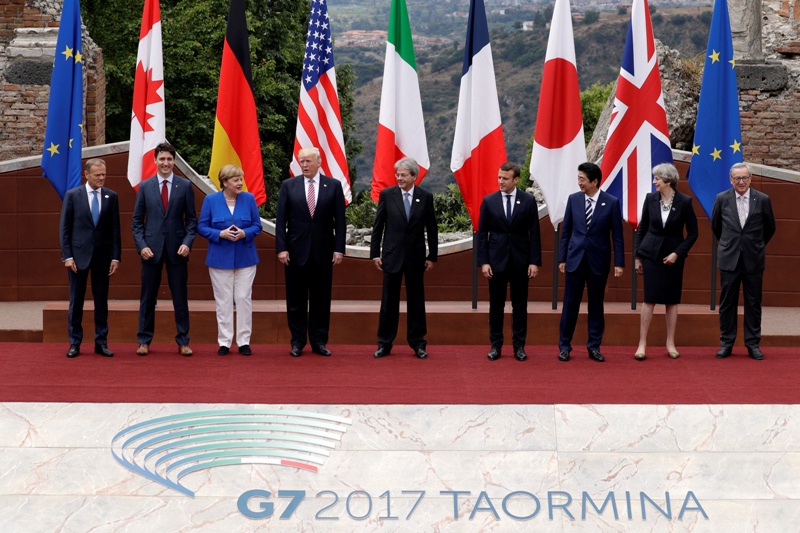G7 seeks demilitarization of ‘disputed’ sea features

The Group of Seven or the seven richest countries in the world have issued a joint communiqué expressing concern about the situation in the East and South China Seas and calling for a demilitarization of “disputed features.” AP/Andrew Medichini
MANILA, Philippines - The Group of Seven (G7) or the seven richest countries in the world have issued a joint communiqué expressing concern about the situation in the East and South China Seas and calling for a demilitarization of “disputed features.”
The joint statement was released following the May 26 and 27 meetings in Taormina, Italy attended by Canadian Prime Minister Justin Trudeau, French President Emmanuel Macron, German Chancellor Angela Merkel, Italian Prime Minister Paolo Gentiloni, Japanese Prime Minister Shinzo Abe and US President Donald Trump.
The leaders strongly opposed any unilateral action that could increase tensions.
They expressed their “commitment to maintaining a rules-based order in the maritime domain based on the principles of international law.”
The joint communiqué voiced support for the United Nations Convention on the Law of the Sea (UNCLOS) and for the peaceful settlement of maritime disputes “through diplomatic and legal means, including arbitration.”
China was “strongly dissatisfied” with the mention of the East and South China Sea issues in the G7 statement as Beijing called on G7 allies to stop making “irresponsible” remarks.
In April, the G7 foreign ministers called for the implementation of The Hague arbitral ruling on the South China Sea, as they reiterated their strong opposition to threat or use of force and building of outposts and their use for military purposes.
The G7 comprises Canada, France, Germany, Italy, Japan, the United Kingdom and the US.
“We consider the July 12, 2016 award rendered by the arbitral tribunal under the UNCLOS as a useful basis for further efforts to peacefully resolve disputes in the South China Sea,” the G7 joint communiqué read.
They also maintained their commitment to the freedom of navigation and over-flight.
The ministers emphasized the fundamental importance of building trust and security and of the peaceful management and settlement of maritime disputes in good faith and in accordance with international law, including through internationally recognized legal dispute settlement mechanisms such as arbitration.
They encouraged dialogue based on international law towards early finalization of an effective Code of Conduct in the South China Sea.
China earlier vowed not to honor the arbitral tribunal ruling as it continued fortifying its artificial islands and restricting Filipinos’ access to disputed waters even if they are within the Philippines’ exclusive economic zone.
- Latest
- Trending




























